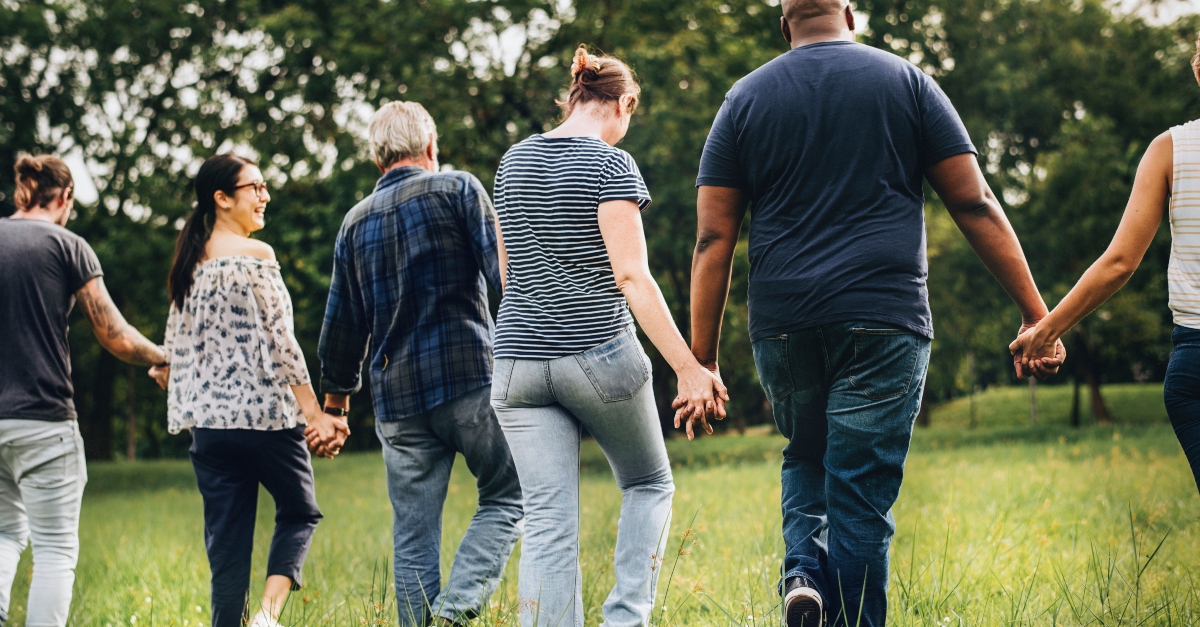
We are called to love each other, so all of us, Black and white, need to allow space for grace, because when we come together, there will be offense on both sides.
As a Christian, I have always felt that regardless of the color of my skin, the church would be a safe place. I imagined there would be no discrimination, no hierarchy based on race, no infiltration of laws that diminished Black people. Perhaps this was all in my imagination, because though I know this is possible, what I have lived for most of my life is a weird reckoning of how Christianity and the church try to deal with racism. There's usually some awkwardness in the body of Christ, as evidenced by the multitude of ethnic congregations. I've worshipped in spaces that are primarily white, Black, Chinese, or West Indian. I've also been made aware of many others—Filipino and South Korean, to name a few. This is a singular experience where I've always noticed the ethnicity of the congregants. To think that we have ethnically divided churches is unfathomable, considering that we are one body united in Christ.
But I think people ultimately gravitate to where they feel comfortable. Many, like me, may have tried other congregations hoping that God's word was the primary connection, but instead became disillusioned when they realized different agendas, whether inadvertent or intentional, were at play. But often in comfort, bias grows and all of a sudden, you'll find that worldly thinking around race has infiltrated the church.
Photo Credit: © Pexels/Tony James Andersson

What I Deeply Desire to Hear from the Church
For me, all I've ever wanted to hear from my brothers and sisters in the church is a basic acknowledgment that racism exists—not only as it relates to police brutality, which has finally sparked a movement in this country—but that it is woven into the very fabric of this nation. The fact that racism exists does not mean that you individually perpetuate it (so no need to feel guilty), but that you are a recipient of its benefits in ways that you may have never considered.
It's the subtleties that are hard to explain, but are real nonetheless. For example:
- Visiting an OB/Gyn who automatically assumes I have fibroids because many Black women get them, treating me like an assumption, instead of my reality.
- Many incredulously commenting on my intelligence or indicating that my family and I are different.
- Initial assumptions about my socioeconomic status simply because I'm Black.
These day to day subtleties are called micro-aggressions, defined as a statement, action, or incident regarded as an instance of indirect, subtle, or unintentional discrimination against members of a marginalized group such as a racial or ethnic minority. Micro-aggressions make up the bulk of day to day living for a Black person, and they are exhausting. When they creep up in the body of Christ, this exhaustion can debilitate.
What it Means to Be Black and White and Christian
In all of this, I'm a Christian first, so this governs how I live. My faith is not lip service, but central to who I am. I'll also acknowledge that there is a lack of understanding on both sides, but the difference is Black people get the short end of the stick.
We are called to love each other, so all of us, Black and white, need to allow space for grace, because when we come together, there will be offense on both sides. However, the offense will feel greater for those who are not the beneficiaries of fair applications of equity and justice.
When Paul writes to the church at Galatia telling them, "There is no longer Jew or Gentile, slave or free, male and female. For you are all one in Christ Jesus. And now that you belong to Christ, you are the true children of Abraham. You are his heirs, and God's promise to Abraham belongs to you.” (Galatians 3:28-29 NLT) Paul assures these believers that, in Christ, they have been fully united with everyone else who is in Christ. There are no lesser Christians in the family of God. Our earthly identifiers create no value distinction between us in our Father's eyes. Jews do not carry a higher rank than Greeks (non-Jews). Free people hold no greater honor than slaves. Men are not superior to women. No race is a "master race," nor any ethnicity inferior. Being one in Christ is possible because Christ holds the most honored position in the family of God, and all Christians are "in Christ." In that way, we are one; we are united. Since none can be higher, and none can be lower, we are equal in the eyes of God.
When we remember we are one in Christ, when we embody Christ's new commandment, loving each other as He loved (John 13:34-35), and when we recall that perfect love casts out fear (1 John 4:18), this changes the way we live.
Photo Credit: © Getty Images/Rawpixel

10 Statements That Refresh a Black Brother or Sister's Parched Soul:
1. I see you – Let's not be colorblind; instead, let's acknowledge the totality of a person. It's the equivalent of tossing the gift wrap to get to the gift. We're part and parcel of the gift, and since our melanated skin is probably what you see first, there's no use in trying to ignore it. We're Black—it’s the skin we're in.
2. I hear you – As you would with anyone else, listen to understand. When we speak, recognize that my experiences are mine, and somewhat unique to me.
3. I love you – Show your love by your actions—invite us to be a part of your life without any awkwardness. Truly love as Christ loved without conditions or restraint.
4. Please forgive me – As you become more aware of your Black friend's life, be open and honest with them. Please acknowledge that you may have conveniently overlooked many parts of their experience because it was too painful for you to deal with or because delusion was better than reality. If you can ever bring this up in conversation, it will go a long way towards cementing a friendship.
5. I want to know you – Not as a curiosity or a caricature, but as a person that you have a genuine interest in. When you want to know someone, you'll go beyond the superficial, empty greeting making your attempts sincere.
6. I acknowledge privilege – Acknowledging the flawed premise on which this country was built does not reduce a person's stature but rather is the start of equity in conversation. When we all start from the same place, it's easier to see the hurdles others have had to overcome.
7. I don't understand – With acknowledgment comes an opportunity to learn and clear up misunderstandings. Your Black brothers and sisters may not be able to help in this regard, but you can also avail yourself of other resources. Don't expect them to teach you everything about what it means to be Black because there are many Black experiences.
8. I will walk alongside you – When we fellowship together regularly, we're all fellows in a ship together walking along, sitting beside, and bearing each other's burdens as if it were your own. Coming alongside another is essential.
9. I'd love to help – By extending an offer to help, whether it is a listening ear, a shoulder to cry on, or a service that is more tangible, your help is an expression of sisterly or brotherly love.
10. Your life matters just as much as mine – Never diminish another's life by uttering that repugnant phrase in response to a Black person's value of his life. Once you know the history of this country, you'll begin to realize that all lives have not mattered. In the body of Christ, my life has equal value and matters just as much as yours.
Perhaps these phrases can be the start of bridging the gap. Let's leave space for grace while exhibiting the love we should all have for each other, for we all precious in His sight.
Photo Credit: © Getty Images/wildpixel

Want more interaction with the women of iBelieve? Join our fans, writers, and editors at the iBelieve Facebook group, Together in Faith, for more videos, stories, testimonies, prayers and more. Visit here to join the community!







